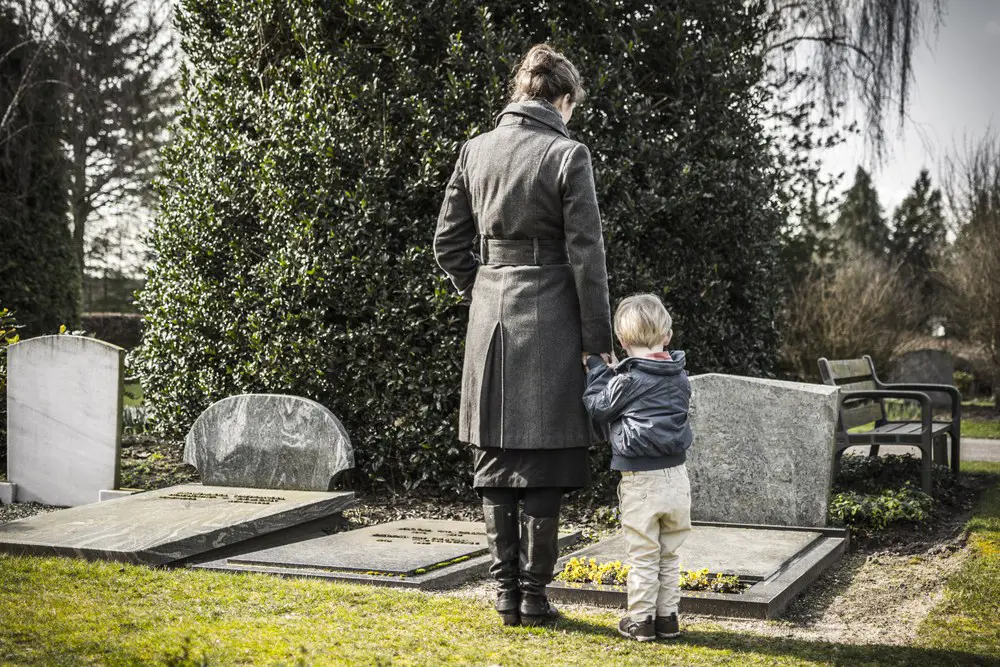The death of a spouse is one of the hardest things we experience in life. In fact, it tops the Holmes-Rahe Stress Inventory scale with a perfect 100. While never easy, it is especially hard when it happens suddenly and unexpectedly.
If you have children, you may be struggling to keep it together for them. After all, they’re going through the loss of a parent. But self-care is extremely important during this time. You can’t be there for them if you don’t know how to take care of yourself first.
 Here are a few excellent tips for coping with the death of a spouse.
Here are a few excellent tips for coping with the death of a spouse.
1. Take Time to Cry
It’s okay to cry. It’s okay to grieve. It’s okay to admit that you’re not okay. For some reason, our society tends to see tears as a bad thing. From a health standpoint, though, tears are hugely beneficial. If you’ve ever wondered why you felt better after a good cry, here’s why.
Crying can actually reduce stress. It activates the parasympathetic nervous system, helping the body to relax and providing a self-soothing effect. It also releases oxytocin and endorphins, both of which help to elevate mood and make you feel better.
Endorphins are the chemicals responsible for the feeling of euphoria you can get from exercise. You may have heard it referred to as a runner’s high.
Oxytocin is informally known as the “love chemical” because your body releases it during skin-to-skin contact and it makes you feel close to the other person. Having sex or breastfeeding both stimulate a lot of oxytocin production. Even a deep hug can trigger its release. But however it’s released, its effect on your mood and mental health is profound. Bet you didn’t know you could get such benefits from a few tears, did you?
We don’t recommend that you dissolve into a blubbering mess, but a healthy cry from time to time is a good thing. And if you’re one of those that staunchly avoids tears because you don’t want to be weak, ease up on yourself a bit. After all, science says it’s good for you to cry.
2. Ask For Help
It’s okay to ask your friends and family for help. In fact, many of them probably want to help, but they don’t know what would be beneficial to you. They may even feel uncomfortable asking because they don’t want to make you feel worse.
Take the mystery out of it for them and let them know what they can do. Don’t have the energy to make meals for your kids? Ask your sister or a friend to come for an afternoon and help you make some freezer meals.
Do you feel that the funeral arrangements are overwhelming? Ask a friend who is good at organizing to help you plan. Call a friend or family member and invite them to coffee or a movie when you just can’t handle being alone. People want to help. Let them.
3. Deal With Your Finances
Finances may seem like the last thing you want to worry about when you’re grieving, but they’re very important. If you ignore them they can become an added weight and source of stress–even if you don’t realize it.
If your spouse worked, you will suddenly have less income. If they were the primary breadwinner, you may be left with little to nothing.
This is what life insurance policies are for. Find out what payouts you may be eligible for so you can start planning. If your spouse died in a work accident you may be able to get compensation. In certain cases, you may even be able to sue for wrongful death.
If your spouse paid all or some of the bills, you need to get organized immediately. If you wait even just a few weeks you could start racking up interest payments and late fees. That’s the last thing you need when money is already tight.
You should also check your insurances like auto and homeowners insurance. Many policies terminate automatically upon the death of the policy-holder. If your spouse was the only person on the policy you could be unwittingly leaving yourself exposed.
If you still owe on the mortgage, you’ll need to take care of this. Sometimes there will be a life insurance or mortgage payment protection insurance policy that will pay off all or a portion of the debt. If there is any remaining debt, you will need to work out an agreement with the mortgage company.
Finances may be the last thing you want to worry about. But once you get it done the relief will be invaluable.
4. Move On…At Your Own Pace
Friends and family may have their own ideas about when you should move on. Some may encourage you to move out of your house, take a vacation, or even start dating again. They’re all doing it from a place of love and because they want to see you happy again.
Sometimes a change of scenery is a good idea. Taking a vacation with your kids can help you spend some quality time together outside of the normal routine. You all have to adjust and figure out how to redefine your family.
Taking classes or learning a new skill can also be a good idea. The sense of accomplishment can help pull you out of your funk and get your brain going again. Exercise releases those feel-good endorphins we talked about earlier. Joining a gym or taking up kickboxing or some other sport can go a long way towards making you feel normal again.
Sometimes you just need to spend some time at home. Look through old pictures. Talk about your spouse with your kids or a friend. Relive your most favorite memories. Maybe even visit some of your favorite hangouts. This can be painful, but cathartic. Most importantly, you decide when you’re ready to do what. Everyone heals at their own pace. There is no pre-prescribed plan that works for everyone. Listen to the advice your friends and family offer–and then decide what’s right for you.
Don’t be afraid to seek out professional help if you need. A grief counselor can help you through the most difficult moments. It doesn’t mean there is anything wrong with you. It’s just nice to have a sympathetic ear and talking about your situation can help you heal.
Life After the Death of a Spouse
The death of a spouse is not something you ever really get over. It’s more like something you learn to live with.
Don’t hold unrealistic expectations for yourself. Don’t set time limits for yourself. If your favorite photograph of your spouse still brings tears to your eyes 5 years from now, that’s okay.
It doesn’t mean you haven’t healed. It just means that you had the great privilege of loving deeply. That’s a gift so many people covet, but never get to enjoy.
Author Bio:
I’m a freelance writer originally from the United States but now I live in Costa Rica with my husband and daughter. I enjoy writing on a variety of topics including health and wellness, pets, travel, culture, and adventure! I combined my passion for photography with writing by launching my own blog (www.lavidainlife.com) about Costa Rican culture, complete with loads of beautiful photos I take myself on our adventures around Costa Rica. As they say in Costa Rica, ¡Pura Vida!











